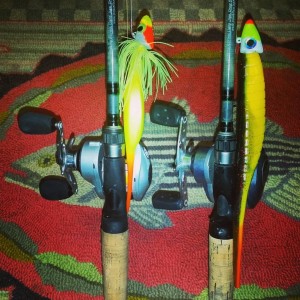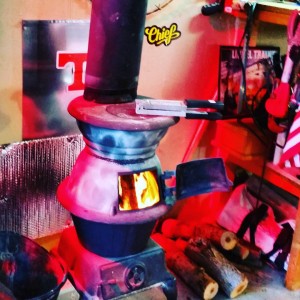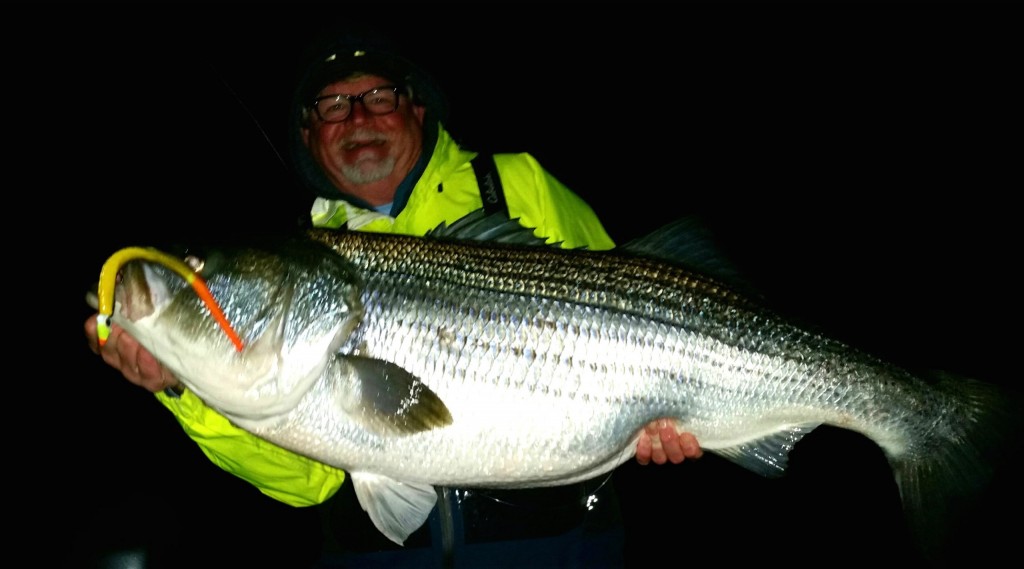 Have you ever belly-crawled through the tall grass beside a mountain stream hoping to sneak up on your favorite fishing spot? Most freshwater anglers understand how important it is to be quiet and sneaky but I’ve noticed that some Chesapeake Bay fishermen don’t fully appreciate the concept of stealth. It won’t be long until the weather breaks and fishermen who are looking to overcome cabin-fever will pack into some of the better-known fishing spots like the warm water discharges, the Susquehanna Flats, and the mouths of Upper Bay rivers. When fish are thick and hungry, you can stomp beer cans in the bottom of your boat and still catch them, but when they’re finicky, stealth becomes a lot more important.
Have you ever belly-crawled through the tall grass beside a mountain stream hoping to sneak up on your favorite fishing spot? Most freshwater anglers understand how important it is to be quiet and sneaky but I’ve noticed that some Chesapeake Bay fishermen don’t fully appreciate the concept of stealth. It won’t be long until the weather breaks and fishermen who are looking to overcome cabin-fever will pack into some of the better-known fishing spots like the warm water discharges, the Susquehanna Flats, and the mouths of Upper Bay rivers. When fish are thick and hungry, you can stomp beer cans in the bottom of your boat and still catch them, but when they’re finicky, stealth becomes a lot more important.
Spring on the Chesapeake Bay is the best time of year to catch the fish of a lifetime, but don’t forget that big fish get that way by being smart. While you might luck into a forty-inch-plus fish once in a while no matter what, your chances increase dramatically when you improve your noise discipline. Here are some tips and tactics that are guaranteed to increase your odds of catching trophy stripers on light tackle:
1. Take an Indirect Approach – Have you heard the joke about how you catch a unique rabbit? You nique up on him! By the same token, if you want to catch a unique fish, like say, one that’s fifty pounds or better, you better get sneaky! When fish are concentrated in a small fishing spot, the temptation is to drift right over them and drop your lures on their heads. That might work for younger, dumber fish, but it won’t catch many trophies. A better idea is to approach your fishing spot very softly, then make the longest casts you can to where you think the fish are. Stripers have a very good sense of hearing and a lateral line that allows them to sense noise, vibration, and even water displacement. They can easily sense a drifting boat when it gets near them.
 2. Turn Off Your Engine – We’ve all been there; four or five boats are working a small fishing spot and everyone is catching until one guy shows up and insists on running his engine while he’s fishing. Why? This isn’t the Atlantic Ocean and there is no safety purpose whatsoever for keeping a motor on. It’s been proven time and again that fish can hear and sense running engines, even trolling motors. Just turn them off. While I understand some fishermen don’t know, there’s a few out there that just don’t care. They’ll never understand the big-fish potential of the spots they’re fishing or the detrimental effect they’re having on those fishing around them.
2. Turn Off Your Engine – We’ve all been there; four or five boats are working a small fishing spot and everyone is catching until one guy shows up and insists on running his engine while he’s fishing. Why? This isn’t the Atlantic Ocean and there is no safety purpose whatsoever for keeping a motor on. It’s been proven time and again that fish can hear and sense running engines, even trolling motors. Just turn them off. While I understand some fishermen don’t know, there’s a few out there that just don’t care. They’ll never understand the big-fish potential of the spots they’re fishing or the detrimental effect they’re having on those fishing around them.
3. Kill your Fish Finder – Click, click, click, click, click. If you’ve ever forgotten to turn off your fish finder when you put your boat on the trailer, you’ve probably heard those tell-tale sonar clicks coming from your transducer. Not all transducers emit an audible click, but many of them do. Stripers can hear a lot better than you can and sound travels much faster through water. I’m convinced those clicks put fish on alert. It’s even possible that they detect the inaudible high frequency sonar waves emitted by a fish finder. When you multiply those transducer clicks and sonar waves by four, five, or even ten boats, it can create a lot of unnatural noise in the water. When fish are in a feeding frenzy, it might not matter, but bigger fish have learned that changes in sound patterns could signal a predator. Here’s something you can bet on. When I show up before dawn at a favorite fishing spot and make that first long cast hoping for the thumping strike of a fifty-pounder, my fish finder will be off.
4. Turn Down The Talk – It is well documented that fish hear and will react to human speech. Studies have determined that goldfish even recognize people by listening to them talk. While I doubt that’s true about striped bass, there’s no doubt they can hear your voice, so shhh, whisper! And while you’re at it, walk softly in the boat and for God’s sake, don’t slam those hatches. Fish can also hear anything that makes the boat vibrate.
 5. Keep It On The Down Low – Contrary to popular belief, you do not have a moral obligation to alert the world about the exact location of where you caught a fish. Nevertheless, it’s just a matter of time before someone hooks up at one of the cold-weather fishing spots and brags about it on the Internet to seven million of their closest friends. They either don’t know or don’t care that others have been fishing those spots for weeks. Not coincidentally, that same guy is just as likely to be the one who shows up running his engine, drifting over the fish, and stomping around in the boat like a marching band. My advice is to use your cell phone for fishing reports, and keep it off the Internet. By the same token, be careful about the backgrounds in your fishing pictures. We all want to see your fish, but it’s not that hard to take pictures that don’t burn the spots your buddies are fishing. The harsh reality is, we live in an intensively-populated region and most people would rather read about where to fish on the Internet than to put in the effort to find fishing spots for themselves. Shhhh.
5. Keep It On The Down Low – Contrary to popular belief, you do not have a moral obligation to alert the world about the exact location of where you caught a fish. Nevertheless, it’s just a matter of time before someone hooks up at one of the cold-weather fishing spots and brags about it on the Internet to seven million of their closest friends. They either don’t know or don’t care that others have been fishing those spots for weeks. Not coincidentally, that same guy is just as likely to be the one who shows up running his engine, drifting over the fish, and stomping around in the boat like a marching band. My advice is to use your cell phone for fishing reports, and keep it off the Internet. By the same token, be careful about the backgrounds in your fishing pictures. We all want to see your fish, but it’s not that hard to take pictures that don’t burn the spots your buddies are fishing. The harsh reality is, we live in an intensively-populated region and most people would rather read about where to fish on the Internet than to put in the effort to find fishing spots for themselves. Shhhh.
I’m certain some will disagree with these tips. The perspectives of saltwater fishermen are often very different from those who’ve learned to appreciate the advantages of stealth in fresh water. Just remember, a bass is a bass and the same tactics that provoke reaction strikes from finicky black bass on the streams and lakes can drastically improve your fishing success for stripers in the Chesapeake Bay. My philosophy is that every detail matters, no matter how small. Many fishermen will never understand the potential of a really good fishing spot. Instead, they’ll show up, catch a few, then swear the little things don’t matter because, in their minds, they had a good day. It’s easy to catch fish that are turned on and actively feeding, but on tough days, it’s attention to detail like noise discipline that can make all the difference.
Fishing should be fun for everyone and we all come at it from different perspectives, so why not be considerate of the other anglers around you? This is the time of year when I don’t always talk about the fish I’m catching, but trust me, the potential can be great. I love seeing anglers catch trophy stripers on light tackle, so I can’t stress enough how important it is to be stealthy if you want to trick the big ones. The Chesapeake Bay might not be mountain stream and you don’t have to low crawl through the bushes to get rockfish to bite, but give stealth a try. I predict you’ll like the results.





Guides are the worst ones. At least one very selfish one.
I fished with a guy who always leaves his engine on and says it don’t matter. He never catchs big but he catches by finding birds. Should you turn off your motor and fish finder when fish are breaking?
Hi Eric — I always kill my engine, no matter what, but breaking fish are frenzied so it doesn’t matter as much about the fish finder. You can get away with a lot more when fish are thick and hungry. That’s why a lot of people come away with the wrong impression that it doesn’t matter anytime. It’s the tough days that make us better fishermen and the little things that result in consistently bigger fish.
Yes it figures that you guys have been catching huge fish and keeping it quite about it but you know who catchs a twenty inch and brags all over the internet.